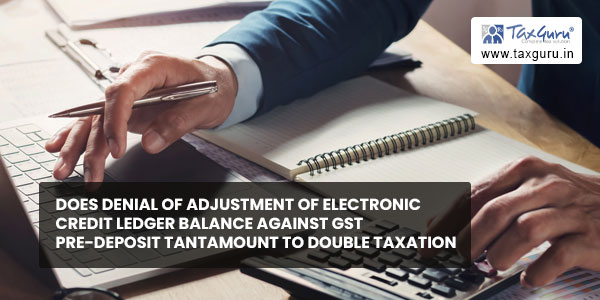Does denial of adjustment of Electronic Credit Ledger balance against GST Pre-deposit tantamount to double taxation ??
Right to file an appeal is the statutory right granted by Tax Laws of the country. Under the GST law, any person aggrieved by the impugned order passed by the assessing authority is entitled to file an appeal before the appellate authorities with certain conditions including payment of pre deposit of taxes.
Generally, Appellant while filing an appeal discharges 100% of admitted tax and pay pre deposit amount of disputed tax as provided under tax laws. Now the question arises here is, can the pre deposit amount of disputed tax be discharged through electronic credit Ledger under GST law.
Recently, Hon’ble High Court of Orissa in the case of M/s. Jyoti constructions limited versus Deputy commissioner of GST 2021-TIOL-2007-HC-ORISSA-GST has held that under the GST law the pre deposit amount of disputed taxes are liable to be paid under electronic cash Ledger only but not through electronic credit Ledger.
In this article, let us try to analyse how the payment of pre deposit of taxes being made while filing an appeal in erstwhile indirect tax regime i.e.in Pre GST Regime in detail and try to apply the same to Post-GST regime.
One of the pre-requisite for admission of appeal before the appellate authority is payment of pre-deposit of taxes. The said payment needs to be made within stipulated time provided under taxing statute. Any delay in payment of pre-deposit of tax or incorrect payment of pre-deposit of tax may result in denial of admission of appeal by the appellate authority. In other words, appeal shall become infructuous. Resultingly. the recovery proceedings shall be initiated by the jurisdictional authorities on the assessee. In this regard reliance is placed in the case of M/s. Ankamma Trading Company vs. The Appellate Deputy Commissioner, Guntur (W.P.13470 of 2009) (AP HC).
In light of the above, let us try to understand various modes of discharging payment of pre-deposit of tax in erst while GST regime:
Various modes of discharging payment of pre-deposit of tax in erst while GST regime
| S.no | Payment of Pre-Deposit of Tax through | Jurisprudence |
| 1 | Electronic Credit Ledger | In the case of Akshay Steel Works (P.) Ltd vs. UOI (2013) 37 taxmann.com 41 (JHK), the court has uphold that the assessee is entitled to utilize Cenvat Credit balance for discharging pre-deposit amount of tax. |
| CESTAT Delhi vide Circular No.15/CESTAT/General/2013-14 dated 28.08.2014 has clarified that pre-deposit payment in respect of any duty can also be made through CENVAT Credit apart from the cash. | ||
| 2 | TDS | In Hrithvik Constructions Ltd Vs. State of Andhra Pradesh (2013) 56 VST 140 the Hon’ble High Court of Andhra Pradesh observed that the TDS amounts lying to the credit of the assessee ought to be considered while calculating the pre-deposit of 12.5% of the disputed tax payable in terms of the second proviso to Section 31(1) of the AP VAT Act. |
| 3 | Refund amount |
In Vijaya Oil Mills Vs. State of Kerala (1980) 45 STC 463 (Ker) the Hon’ble High held that the appellant was entitled to adjust the tax liability pursuant to demand notice with the assessed amount of tax refund for the previous year , in satisfaction of its tax liability. Similarly in the case of Gandhi Sons Vs Assistant Commissioner, Special Circle (1994) 95 STC 205 (Ker) the Hon’ble High Court of Kerala observed that the assessing authority was bound to adjust the refund due towards the tax liability when the sum due to the petitioner was more than sufficient to cover the demand and the petitioner had made a request for such adjustment. It was not open to the assessing authority to delay the refund, and at same time make demand for amounts due from the petitioner as if the amounts were not adjustable against each other. The notice of demand was unsustainable and contrary to law. |
Similarly, in N.C. Mukherjee and Co. v. Union of India (1968) 68 ITR 500 (SC) where the Supreme Court had recognised the compelling equity of adjustments and appropriations of the tax payments. The Supreme Court had laid down the procedure to be followed in cases where there are amounts due to the state and from the state. The assessing authority is bound to adjust the amount due to the assessee and recover only the balance if any. The relevant extract of the judgment is as under:

“We think that justice demands that before the Certificate Officer executes the demand against the appellant-firm, amounts refundable to it or its partners should be ascertained by the concerned Income-tax Officer so that the demand may be executed only for the balance. We, therefore, direct the concerned Income tax Officer to complete his enquiry in regard to the amounts refundable to the appellant-firm or its partners under the Income-tax Act within three months from the receipt of the order by him. The Certificate Officer will thereafter execute the demand for the balance of the amount, if any, due from the appellant-firm.”
The above judgments clearly stipulate that payment of tax before the assessing authority need not be given in cash or by issuing cheque. It can be by adjustment also and the Assessing authority is bound to adjust the same towards the balance amount due under the order of assessment, particularly when the assessee had made a request for such adjustment.
GST Appeal Provisions on mode of payment of pre-deposit of tax.
GST law specifies the amount of pre deposit of taxes to be made by the assessee if they are aggrieved by the impugned order passed by the assessing authority i.e. Appellate Authority (10%), Appellate Tribunal (20%). GST Appeal provisions are however silent on mode of payment of pre-deposit of tax.
It is pertinent to note here that under GST Law, at the discretion of assessee, Output Tax can be offset either by Electronic Credit Ledger or Electronic Cash Ledger. In this regard reliance is placed in the case of UOI vs. Bharathi Airtel Ltd (SC).
However, in Jyothi Constructions Judgment, the High Court has observed the difference between “Output Tax” and “Self Assessed Output Tax” and laid down following proposition of law:
Proposition of law laid down in Jyothi Constructions judgement:
- As per Section 41(2) of GST Act -Electronic Credit Ledger can be utilized only for payment of ‘self assessed output liability’ of the assessee. In other words, Electronic Credit ledger can be utilized only for discharging self assessed output tax liability in GSTR 3B.
- Pre-deposit of tax is not self assessed output tax and therefore, the same is liable to discharged through Electronic Cash ledger.
It is interesting to note here that during Post GST Regime, CBIC vide Circular No. 42/16/2018-GST dated 13.04.2018 has clarified that wrongful availment of CENVAT Credit/ Arrears of Service tax or central excise arising from assessment proceedings in erstwhile regime may be inter-alia discharged through electronic credit ledger.
From the said circular and jurisprudence laid down by different courts in Pre-GST regime, the department has to clarify the Electronic Credit Ledger can be utilized for payment of pre-deposit towards GST proceedings.
Otherwise, the said proposition of law (Jyothi Constructions) poses additional burden on the assessee with surplus Electronic Credit Ledger balance and may result in working capital issues. It is not out of place to mention that the covid fall out also made huge negative impact on the financial prospect of business houses. Keeping in view the long term sustainability and stability of the tax payers also it is the need of the hour. So it is a high time for the CBIC to come up with a clarification on this issue and promote ease of doing business in India.
*****
( The views expressed in this article are strictly personnel)
The Author of the Article can be reached at prudhvitadepalli@gmail.com





